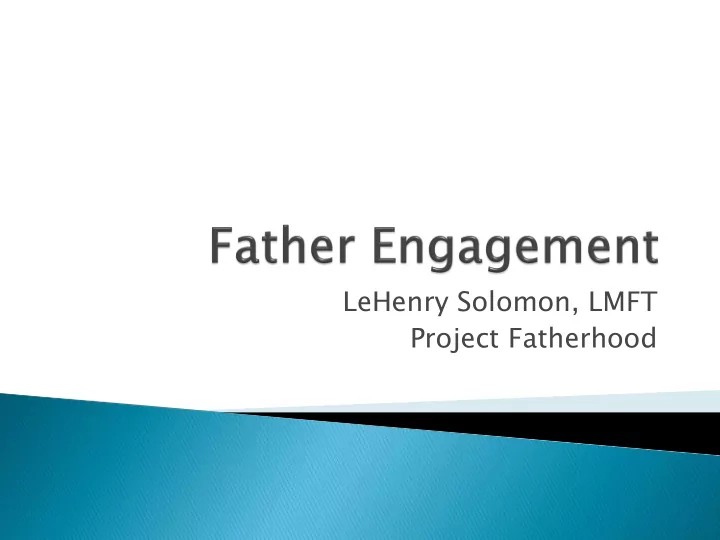

LeHenry Solomon, LMFT Project Fatherhood
Some definitions of engagement/engage include “greatly interested, emotional involvement or commitment” Are fathers not greatly interested, have or show emotional involvement or commitment towards their children? What are our own thoughts/feelings/perceptions of how fathers think and feel about nurturing their children? Some definitions of enlightenment include “to give knowledge or understanding to, to explain.” So the question becomes do we want to “engage” fathers in our services or do we want to “enlighten” fathers to the impact of participation/involvement in the lives of their children?
Per Percep eption Fathers often believe their involvement as a parent is being judged and scrutinized which can lead to feelings of insecurity and shame. La Langu guage ge Vocabulary to describe parenting programs, skills and tasks are often framed from a maternal perspective. It is important to be as inclusive as possible in our language as a reference to valuing the father’s role and participation. Ro Role le Fathers have historically been told that their care for their children is thru their financial provision. Fathers often do not value their role as a nurturer/caregiver. There can also be cultural implications regarding this as well.
Fatherless children are twice as likely to drop out of school than their classmates who live with two parents. 70% of the children now incarcerated in juvenile corrections facilities grew up in a single-parent environment. Children in father-absent homes are almost four times more likely to be poor. 80% of adolescents in psychiatric hospitals come from fatherless homes. 63% of youth suicides are from fatherless homes-5 times the average.
By about 24 weeks, your baby can hear sounds from outside, and that includes your voice. Several studies suggest the quality and quantity of baby-father contact has a direct impact on how secure children feel growing up. There is also research showing that toddlers and young children who spend more time playing with their dads are more likely to be sociable when starting nursery school. Babies with strong attachments to their dads tend to have fewer behavioral problems later on. Substantial father involvement from at least the first month after birth promotes better language development and better cognition skills (suggested by higher IQ scores) among toddlers and young children. Even from birth, children who have an involved father are more likely to be emotionally secure, be confident to explore their surroundings, and, as they grow older, have better social connections.
Numerous studies find that an active and nurturing style of fathering is associated with better verbal skills, intellectual functioning, and academic achievement among adolescents. Toddlers with involved fathers go on to start school with higher levels of academic readiness. They are more patient and can handle the stresses and frustrations associated with schooling more readily than children with less involved fathers. Babies who are held and comforted when they need it during the first six months of life tend to be more secure and confident as toddlers and older children. Behavior problems, delinquency, depression, substance abuse and overall psychological adjustment are all more closely linked to dad's rejection than mom's, Knowing that kids feel loved by their father is a better predictor of young adults' sense of well-being, of happiness, of life satisfaction
When fathers are involved in the lives of their children, especially their education, their children learn more, perform better in school, and exhibit healthier behavior. Even when fathers do not share a home with their children, their active involvement can have a lasting and positive impact. The presence of a responsible father promotes improves academic performance and reduces disciplinary problems among children. Preschoolers with actively involved fathers have stronger verbal skills. Research shows that even very young children who have experienced high father involvement show an increase in curiosity and in problem solving capacity. Fathers’ involvement seems to encourage children’s exploration of the world around them and confidence in their ability to solve problems. When non-custodial fathers are highly involved with their children’s learning, the children are more likely to get A's at all grade levels.
Staffing Images Literature Language
Purposeful, Goal-Oriented Communication What? Is the service/program? Does the father need/should know? Why? Is it important to the father/family? Goal/Expected Outcome What are/is the expected short/long-term goals and outcomes of participating?
You are the best practice. Self-awareness and sincerity is the most important factor in engaging fathers. Fathers, as we all, can tell if our involvement/presence is sincerely desired and often respond accordingly. Do you find fatherhood to be a luxury or a necessity? Why are you trying to engage this father? Do you believe his involvement is a benefit to his children or just a part of protocol? Your own sincere answers/reflection as to why you answered the way you did is your greatest tool.
Project Fatherhood Fatherhood.Gov Fatherhood.Org
LeHenry Solomon, LMFT E-mail: lsolomon@childrensinstitute.org Phone: 213.385.5100 x6309
Recommend
More recommend